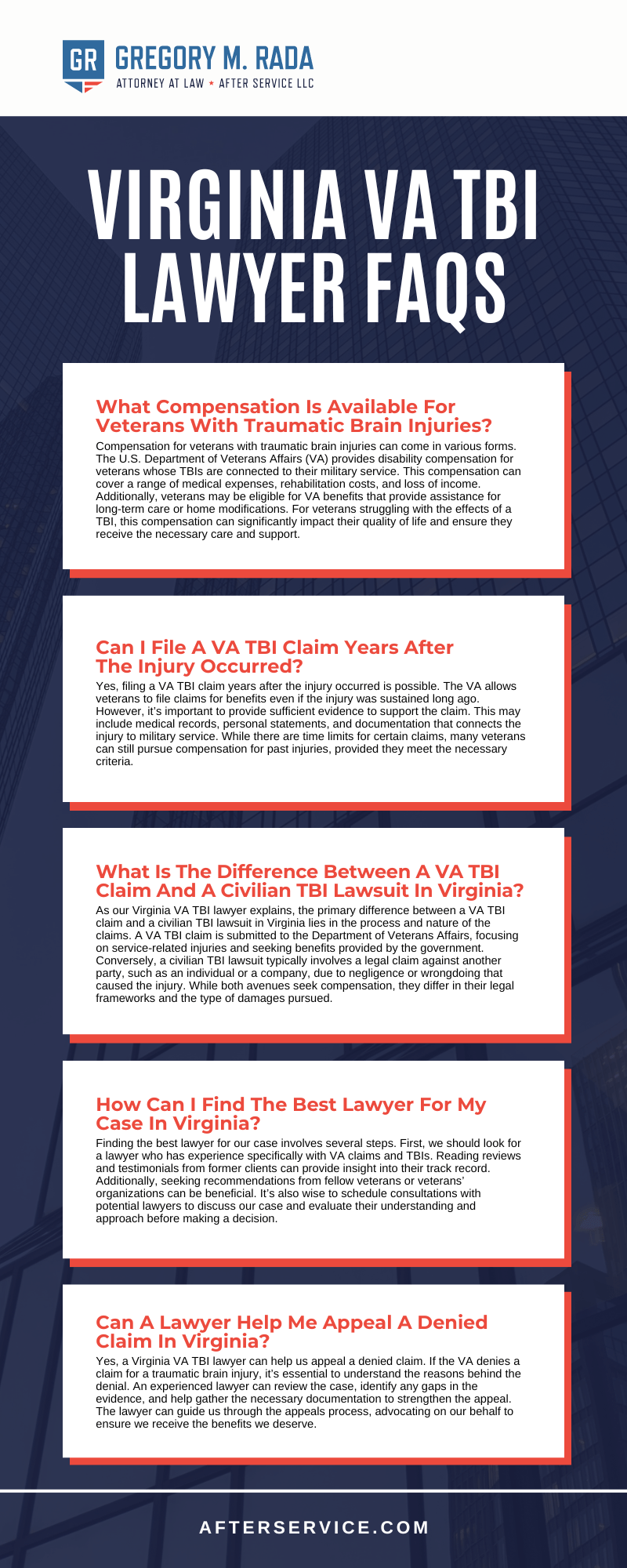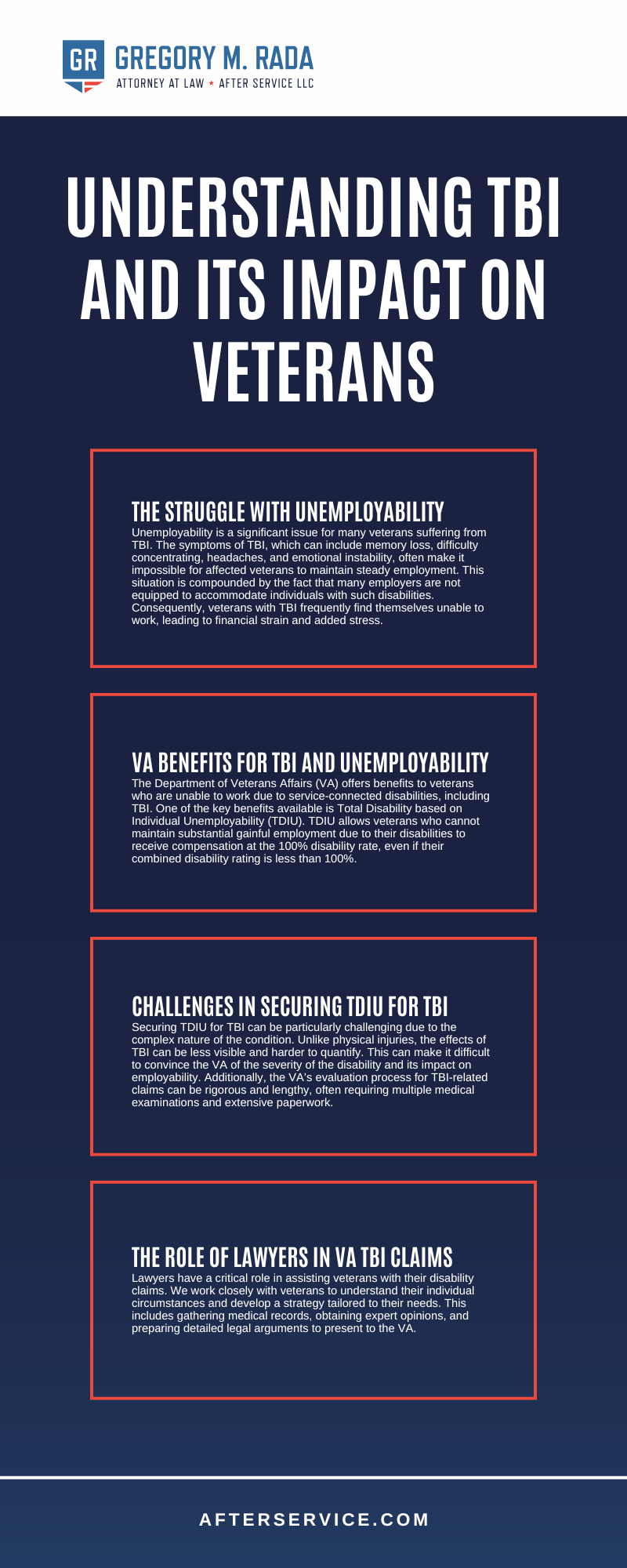
VA TBI Lawyer Virginia
Traumatic brain injuries can occur in combat, and members of service can suffer greatly. If you have sustained a head injury during your service, then you may be eligible to receive disability benefit compensation. Gregory M. Rada, Attorney at Law is a veteran himself, and takes pride in offering legal assistance to veterans in need. He understands that service members give up so much for the greater good and deserve to be taken care of when needed. If you have questions about your eligibility for VA disability benefits, then contact our VA TBI lawyer as soon as possible. Greg can meet with you to learn more about your individual situation over a consultation.
TBIs In Combat
Service members can sustain traumatic brain injuries in combat or when performing other service-related responsibilities. If you have suffered a head injury, and have residuals of a TBI, then you may qualify for disability compensation benefits. Residuals of a TBI are categorized together into general symptoms. Examples of physical symptom residuals can be headaches or migraines, bone fractures, degraded vision, fever, difficulty speaking or eating, fatigue, loss of sense of touch or hearing, and more. Cognitive effects can entail memory loss, lack of concentration or attention, lack of reasoning or judgment, hindered ability to understand information, communication problems, and reduced ability to assemble, plan, and organize. Veterans may also experience behavioral and emotional TBI residual symptoms such as agitation, anxiety, impulsiveness, frustration, depression, regression, repetitiveness, and inability to control emotions and impulsive behavior.
Traumatic Brain Injury Evaluation
The VA provides compensation for veterans who have TBI residual symptoms. These symptoms are categorized into four categories, including physical dysfunction, emotional/behavioral, subjective symptoms, and cognitive impairment. If a TBI residual symptom is ratable based on the diagnostic code, then it should receive a schedule rating accordingly. If you have questions about this assessment, contact Greg right away. There are times when the VA makes decisions that are not correct or fair based on the veteran’s case. Our VA TBI attorney understands that receiving benefits can make a difference in someone’s life. Veterans deserve support after everything they have been through.
Gregory M. Rada, Attorney At Law
Greg has been representing fellow veterans since 2012. He began his law firm so that veterans had access to legal insight from someone who was a veteran himself. He exclusively handles VA disability benefits, survivor benefit appeals, and pension at all levels of the VA process. Before becoming a VA TBI attorney, he served in the United States Air Force as a C-17 loadmaster, earning a Staff Sergeant ranking. He served in Iraqi Freedom and Operations Enduring Freedom, with over 2,000 flying hours and more than 800 combat flying hours. To speak with Gregory M. Rada, Attorney at Law about your case, do not hesitate to reach out to book a consultation. You can trust that Greg is on your side and ready to advocate for your right to VA benefits.
Understanding TBI And Its Impact On Veterans
As a Virginia VA TBI lawyer, we understand the unique challenges faced by veterans and are dedicated to helping them secure the benefits they deserve. Traumatic Brain Injury (TBI) is a serious concern for many veterans returning to civilian life. Gregory M. Rada, Attorney at Law, specializes in VA disability compensation appeals for disabled veterans and Dependency and Indemnity Compensation (DIC) appeals for surviving spouses. TBIs often result from head injuries sustained during combat or training exercises. These injuries can lead to long-term physical, cognitive, and emotional challenges, making it difficult for veterans to lead a normal life or secure stable employment.
The Struggle With Unemployability
Unemployability is a significant issue for many veterans suffering from TBI. The symptoms of TBI, which can include memory loss, difficulty concentrating, headaches, and emotional instability, often make it impossible for affected veterans to maintain steady employment. This situation is compounded by the fact that many employers are not equipped to accommodate individuals with such disabilities. Consequently, veterans with TBI frequently find themselves unable to work, leading to financial strain and added stress.
VA Benefits For TBI And Unemployability
The Department of Veterans Affairs (VA) offers benefits to veterans who are unable to work due to service-connected disabilities, including TBI. One of the key benefits available is Total Disability based on Individual Unemployability (TDIU). TDIU allows veterans who cannot maintain substantial gainful employment due to their disabilities to receive compensation at the 100% disability rate, even if their combined disability rating is less than 100%.
To qualify for TDIU, veterans must demonstrate that their service-connected disabilities prevent them from securing and following a substantially gainful occupation. This process often requires substantial medical evidence and a thorough understanding of VA regulations. As a Virginia VA TBI lawyer, we are committed to helping veterans gather the necessary documentation and present a compelling case to the VA.
Challenges In Securing TDIU For TBI
Securing TDIU for TBI can be particularly challenging due to the complex nature of the condition. Unlike physical injuries, the effects of TBI can be less visible and harder to quantify. This can make it difficult to convince the VA of the severity of the disability and its impact on employability. Additionally, the VA’s evaluation process for TBI-related claims can be rigorous and lengthy, often requiring multiple medical examinations and extensive paperwork.
Despite these challenges, it is crucial for veterans to persist in their claims. The benefits provided through TDIU can make a significant difference in the quality of life for veterans with TBI, offering them financial stability and access to necessary medical care. Our team at Gregory M. Rada, Attorney at Law, is dedicated to supporting veterans through every step of this process, providing the guidance and advocacy needed to secure the benefits they deserve.
The Role Of Lawyers In VA TBI Claims
Lawyers have a critical role in assisting veterans with their disability claims. We work closely with veterans to understand their individual circumstances and develop a strategy tailored to their needs. This includes gathering medical records, obtaining expert opinions, and preparing detailed legal arguments to present to the VA.
Our goal is to simplify the process as much as possible for veterans, alleviating the burden of dealing with the VA bureaucracy. We are committed to ensuring that veterans receive the full benefits they are entitled to, recognizing the sacrifices they have made for our country.
Taking The Next Step
If you or a loved one is a veteran suffering from TBI and struggling with unemployability, it’s essential to seek legal assistance to navigate the complexities of the VA benefits system. As a dedicated Virginia VA TBI lawyer, we are here to help you every step of the way. Contact us today to schedule a consultation and take the first step towards securing the benefits you deserve. Let Gregory M. Rada, Attorney at Law, be your advocate in this important journey. As a veteran of the U.S. Air Force, Mr. Rada can relate to his clients, and as a disabled veteran, he also has special insight into the disability claims process. His experience was a drawn-out ordeal that took eight years from initial claim to completion, so he understands the consequences of filing a VA disability claim without adequate preparation or legal counsel.
Virginia VA TBI Statistics
According to the U.S. Department of Veteran Affairs, between 2000 and late 2019, nearly 414,000 U.S. service members worldwide sustained a TBI. More than 185,000 veterans who use VA health care have been diagnosed with at least one TBI, mostly mild cases. However, the VA believes the incidence of TBI may be underreported.



Virginia VA TBI Infographic

Finding The Best VA TBI Lawyer For Your Needs
Finding the right VA TBI Lawyer for a Veterans Affairs (VA) Traumatic Brain Injury (TBI) claim can be crucial to getting the compensation and support you deserve. Traumatic brain injuries can have long-lasting effects, and it’s important to have the best representation possible to navigate the VA claims process. Gregory M. Rada has been representing his fellow veterans before the Veterans Administration since 2012. He started After Service LLC so veterans would have access to a law firm founded by a veteran. Here are some steps to help you find the best lawyer for your needs.
Research Lawyers With VA TBI Experience
Start by researching lawyers who have specific experience handling VA TBI cases. While many lawyers may handle VA disability claims, not all have the detailed knowledge required for TBI cases. A lawyer with a strong background in TBI cases will better understand the medical aspects of brain injuries and the VA’s requirements for these specific claims. Look for attorneys who highlight their experience on their websites or in their professional profiles.
Check Qualifications And Accreditation
Make sure that any lawyer you consider is accredited by the VA to represent veterans. This accreditation ensures that the lawyer has been recognized by the VA as someone who can competently assist with VA claims. In addition, verify that they are licensed to practice in Virginia. Checking these qualifications will help you find a lawyer who is properly equipped to handle your TBI case.
Read Client Reviews And Testimonials
Client reviews and testimonials can provide valuable insights into a lawyer’s effectiveness and approach. Look for reviews that specifically mention the lawyer’s work on VA TBI claims. Positive feedback from clients who had similar cases can give you confidence in your choice. While no lawyer will have a perfect record, consistent positive feedback is a good indicator of a lawyer’s competence and client care.
Ask About Their Approach To VA TBI Cases
When you contact potential lawyers, ask them about their approach to handling VA TBI cases. Some important questions to consider include: How do they plan to prove the connection between your TBI and your service? What strategies do they use to maximize your VA benefits? How familiar are they with the types of medical evidence needed for TBI claims? The answers to these questions can give you a sense of how well the lawyer understands the process and what they will do to advocate for you.
Schedule A Consultation
Once you’ve narrowed down your options, schedule consultations with a few lawyers. Many lawyers offer free initial consultations, allowing you to discuss your case without commitment. Use this opportunity to assess their communication skills, willingness to answer your questions, and overall demeanor. A good Virginia VA TBI lawyer should make you feel comfortable and provide clear explanations about how they can assist with your claim.
Evaluate Their Communication Style
Effective communication is essential in any attorney-client relationship. During your consultations, pay attention to how well the lawyer listens to you and how clearly they explain complex topics. You want a lawyer who is approachable, takes the time to understand your situation, and keeps you informed throughout the process. Good communication can make a significant difference in how smoothly your case progresses.
Consider Their Fee Structure
Before making a final decision, ask about the lawyer’s fee structure. Most VA disability lawyers work on a contingency basis, meaning they only get paid if you win your case. Make sure you understand how fees are calculated and whether there are any additional costs you should be aware of. A transparent fee structure can help you avoid unexpected expenses down the line.
Look For A Personal Connection
Finding the best lawyer isn’t just about credentials and experience; it’s also about finding someone you can trust and feel comfortable with. A personal connection can make it easier to discuss sensitive issues related to your case and help build a stronger attorney-client relationship. Trust your instincts and choose a lawyer you feel confident will advocate for your best interests.
Review Their Track Record
Finally, ask about the lawyer’s track record with VA TBI claims. While past results do not guarantee future outcomes, a lawyer with a history of successfully handling similar cases can be a good choice. Look for a lawyer who has achieved favorable outcomes in TBI cases and has a reputation for tenacious advocacy.
Legal Assistance That Fits Your Needs
Choosing the right lawyer for your VA TBI claim can make all the difference in your case. At Gregory M. Rada, Attorney at Law, we have a team of dedicated professionals ready to help you navigate your VA TBI claim. Greg exclusively handles VA disability compensation, pension, and survivor benefit appeals at all levels of the VA adjudicative process including at Regional Offices nationwide, the Board of Veterans’ Appeals (BVA), and the Court of Appeals for Veterans Claims (CAVC). He is honored to have a job serving other veterans and their families. If you’re looking for a Virginia VA TBI lawyer who will provide personalized attention and experienced representation, contact us today to schedule a consultation. Let us help you get the benefits you deserve.
Virginia VA TBI Infographic


VA TBI FAQs
We have a deep focus on helping veterans living with traumatic brain injuries (TBI) get the disability benefits they deserve. Our team is led by Attorney Greg Rada, who brings over a decade of experience representing disabled veterans. Because we work only on VA disability claims, we’ve developed a thorough understanding of how the VA evaluates and rates TBI cases. We don’t just know the law—our Virginia VA TBI lawyer has worked one-on-one with veterans from every branch of service, helping them gather evidence, overcome denials, and achieve fair ratings for the challenges they face. If you’re dealing with the effects of a TBI from military service, this guide can help answer your most important questions.
What Percentage Does VA Pay For TBI?
The VA rates traumatic brain injuries at 0%, 10%, 40%, 70%, or 100%, depending on the severity of the symptoms and how they affect your ability to function in daily life. The rating is based on three main areas: cognitive impairment, emotional or behavioral dysfunction, and physical symptoms such as headaches or dizziness. The VA uses a system called the “TBI table” to evaluate each area and assign a disability percentage. The higher the level of impairment in these areas, the higher your rating will be. It’s also common for veterans with TBI to have additional service-connected conditions like PTSD or migraines, which can raise the overall combined rating.
How Do I Prove My TBI To The VA?
To prove a TBI claim, you need three key elements: evidence of an in-service event that caused the injury (such as a blast, fall, or vehicle accident), a current diagnosis of TBI or its lasting effects, and a medical opinion that links the two. Service treatment records, line-of-duty reports, and buddy statements can help establish the event. Medical records showing symptoms like memory loss, mood changes, or coordination problems help document the current diagnosis. A strong nexus letter from a medical professional can provide the link between your service and your current condition. We help veterans gather and organize all of this evidence to maximize disability benefits.
What Is The TBI Scale For The VA?
The VA uses a standardized evaluation known as the “table of facets of TBI-related cognitive impairment and other residuals.” This table breaks down symptoms into ten categories, such as memory, judgment, attention, motor skills, communication, and more. Each category is rated on a scale from 0 (no impairment) to 3 (severe impairment), and the VA assigns the overall rating based on the highest-rated category. This is why it’s important to present a complete picture of how your TBI affects multiple areas of life, not just one. Our Virginia VA TBI lawyer often works with medical professionals who understand this table and can provide evaluations that reflect the full scope of a veteran’s symptoms.
How To Get 100 Percent For TBI?
To receive a 100% rating for TBI, your condition must cause total impairment in one or more areas listed in the VA’s TBI evaluation table. This may involve complete loss of memory for recent events, severe communication difficulties, inability to perform basic daily tasks without supervision, or extreme cognitive and behavioral changes. Some veterans receive a 100% rating based solely on TBI, while others qualify through a combination of TBI and related conditions. We carefully review our clients’ medical records and sometimes refer them for independent exams to fully document the severity of symptoms. A detailed and well-supported claim is key to reaching the highest rating.
What Disabilities Can The VA Not Prove?
The VA doesn’t automatically deny certain disabilities, but some are harder to prove without strong documentation. Conditions without a clear medical diagnosis or those based mainly on subjective symptoms—like chronic fatigue or unexplained pain—can be more difficult. For TBI-related claims, if the event wasn’t documented or there’s a long gap between service and diagnosis, the VA may question the connection. However, with the right evidence and legal support, even tough claims can succeed. We’ve helped many veterans get approvals after years of denials, especially in TBI cases where symptoms often overlap with mental health or neurological conditions.
Is It Hard To Get Disability For A TBI?
TBI claims can be challenging, especially if symptoms are subtle or develop slowly over time. The VA may overlook signs or misclassify the condition as something else, like anxiety or depression. Some claims are denied simply because the evidence wasn’t detailed enough or the exam was incomplete. That’s where experienced legal help can make a difference. We understand how the VA evaluates these cases and what kind of documentation makes a strong impression. While it’s not always easy, with the right approach, many veterans successfully receive compensation for TBI and its long-term effects.

VA TBI Glossary
Veterans who have experienced head injuries during military service often face a complex path when applying for benefits. As a Virginia VA TBI lawyer, we work closely with veterans living with traumatic brain injuries (TBI) to help them get the support they deserve. The terminology used by the Department of Veterans Affairs (VA) can be difficult to interpret, especially when it comes to how the VA defines and rates symptoms. This glossary clarifies key phrases and terms commonly used in VA TBI disability claims, helping veterans and their families better understand the language used in the process.
Residuals Of Traumatic Brain Injury
When the VA refers to “residuals” of a TBI, they mean the long-term symptoms and impairments that persist after the initial injury has healed. These residuals are grouped into several categories, including physical symptoms (such as migraines, speech problems, or sensory loss), cognitive issues (like memory impairment and attention deficits), and behavioral/emotional changes (including irritability, impulsiveness, or depression). The VA evaluates these symptoms individually and uses them to determine a veteran’s disability rating. Because symptoms may fluctuate or overlap with other conditions, accurate and consistent medical documentation is essential when filing a claim.
Total Disability Based On Individual Unemployability (TDIU)
Total Disability based on Individual Unemployability (TDIU) is a VA benefit that compensates veterans at the 100% disability rate, even if their combined rating is below that threshold. TDIU is awarded when a service-connected condition—such as TBI—prevents the veteran from maintaining substantially gainful employment. Veterans applying for TDIU must provide evidence that their disability directly affects their ability to hold a steady job. This evidence can include vocational assessments, medical records, and lay statements from friends or former employers. Veterans facing challenges related to TBI often qualify for this benefit due to the severity of cognitive or behavioral impairments.
Table Of Facets Of TBI-Related Cognitive Impairment
The VA uses a standardized chart known as the “Table of Facets of TBI-Related Cognitive Impairment and Other Residuals” when assigning a disability rating. This chart divides symptoms into ten categories, such as memory, attention, judgment, communication, and executive function. Each category is scored from 0 to 3, with higher scores indicating more severe impairment. The highest individual score across any facet determines the veteran’s final TBI rating. Because the evaluation is based on this structured system, submitting medical evaluations that address each facet directly increases the likelihood of receiving an accurate rating.
Nexus Opinion
A nexus opinion is a written medical statement that connects a veteran’s current medical condition to their military service. For TBI claims, this is a crucial piece of evidence. It typically comes from a licensed medical professional who reviews the veteran’s history, service records, and current symptoms to determine whether it is at least as likely as not that the TBI was caused by a service-related event. Without a strong nexus opinion, even clear-cut cases may be denied by the VA. We help veterans obtain these opinions from providers familiar with VA standards.
Substantially Gainful Employment
This term is used by the VA to describe work that provides a wage above the federal poverty threshold for one person. It’s a key component in determining eligibility for TDIU. If a veteran’s disabilities prevent them from securing and maintaining substantially gainful employment, they may qualify for full compensation under TDIU, even if they can do limited or part-time work. Jobs in protected environments or volunteer positions do not typically count as substantially gainful. Veterans with TBI may struggle with concentration, memory, and emotional regulation, all of which can interfere with consistent job performance.
If you’re dealing with service-connected TBI symptoms and aren’t sure where to start, we can help you prepare and file a solid claim. Let Gregory M. Rada, Attorney at Law, guide you through the VA system with the perspective of someone who has personally been through it.
Reach out to Greg today to schedule your case evaluation, he’s here to listen and help you take the next step toward the benefits you’ve earned.
Get Help From Our Attorney Who Knows TBI Claims
Our team at Gregory M. Rada, Attorney at Law specializes in VA disability cases, including hundreds involving traumatic brain injuries. Greg’s experience as a disabled veteran gives him a personal stake in every case, and we apply that same commitment to every veteran we represent. If you’re struggling to get the right rating—or any rating at all—for your TBI, our Virginia VA TBI lawyer can help. Contact Attorney Greg Rada today for a free case review and let us help you get the benefits you deserve.
Office
1580 N Logan St, Ste 660, PMB 4545
Denver, CO 80203
Representing Veterans Nationwide







